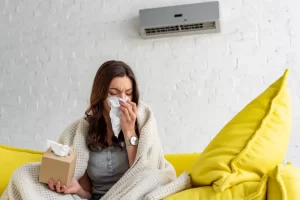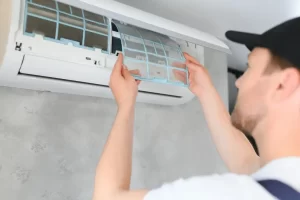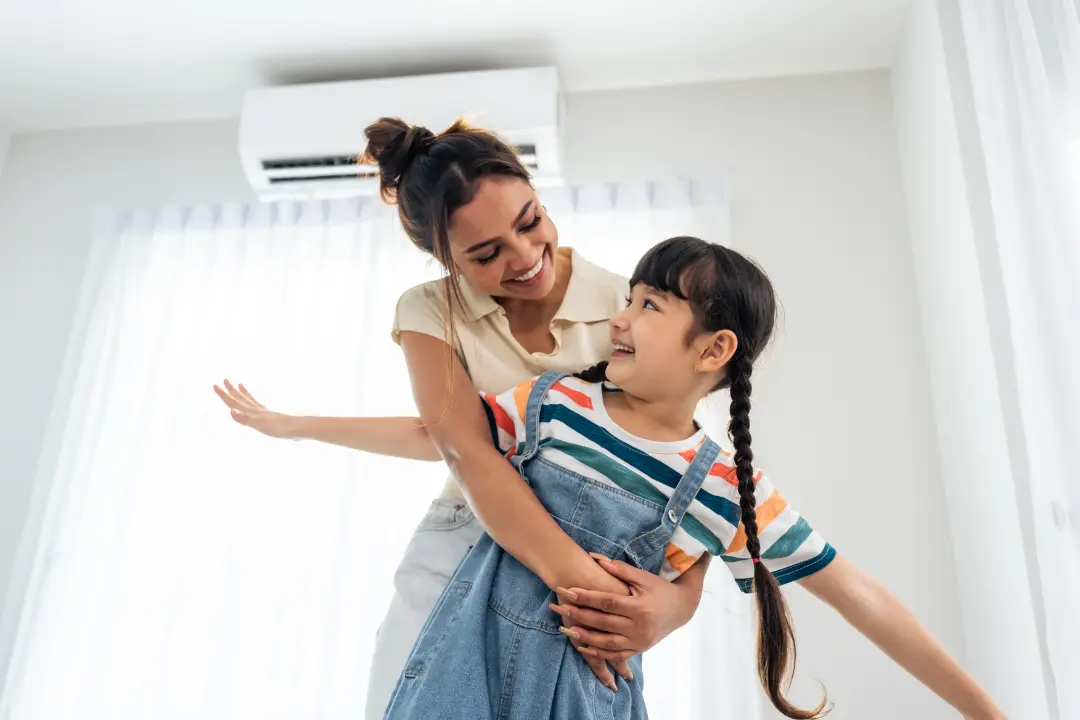Air conditioner allergy symptoms can be frustrating and challenging to deal with. However, there are some strategies you can use to avoid these symptoms and keep the air in your home free of allergens.
In this comprehensive guide, we will provide actionable tips on how to avoid air conditioner allergies and maintain a comfortable living environment. Following the advice in this guide will help you keep your air clean and free from allergens.
Key Takeaways
- Air conditioner allergies are caused by allergens, not the air conditioning itself. These allergens include pollen, dust mites, mould, and pet dander.
- High-quality air filters with appropriate MERV ratings and regular replacement according to manufacturer guidelines are critical for trapping allergens and maintaining indoor air quality.
- Professional maintenance and specialised cleaning services, such as those we offer at SmartWay Air Conditioning, are essential in combating allergen buildup and ensuring the AC system circulates clean air.
What Causes an Air Conditioner Allergy?
Air conditioner allergy, sometimes referred to as air conditioning sickness, is not a reaction to the air conditioning system itself but rather to the allergens circulated by the AC unit. In other words, people are not allergic to air conditioning but rather to common culprits such as pollen, dust mites, mould, and pet dander.
These particles can trigger allergic reactions. They may cause symptoms such as sneezing, a runny nose, and itchy eyes. If the system is not properly maintained and cleaned, air conditioners can worsen allergy symptoms. This happens because they distribute contaminants like airborne bacteria and viruses. These contaminants can cause illnesses such as hypersensitivity pneumonitis, allergic rhinitis, or asthma.
One key factor that leads to allergens circulating by the air conditioning unit is the state of the air filters. If the filters are dirty or clogged, they won’t be able to effectively trap these allergens, leading to their distribution throughout your living space.
In addition, air ducts can accumulate dust, mould, and other allergens, which are then distributed throughout the home when the system is running.

Common Allergens and Irritants in Your Home
Many allergy symptoms start with the presence of common allergens and irritants that can accumulate indoors, especially when air conditioning is in use.
- Dust mites are one of the most prevalent indoor allergens, thriving in warm, humid environments such as bedding, carpets, and upholstered furniture. These microscopic pests feed on flakes of human skin and can quickly multiply if indoor humidity levels are not properly managed.
- Pet dander is another frequent culprit, consisting of tiny, airborne particles shed by cats, dogs, and other animals. When air conditioning units are running, they can circulate pet dander throughout your home, increasing the risk of allergic reactions for sensitive individuals.
- Mould growth is also a significant concern, particularly in damp areas like bathrooms, kitchens, or around leaky windows and doors. Mould spores can become airborne and trigger allergic reactions, especially if indoor air quality is compromised by poor ventilation or high humidity.
- Pollen particles, often associated with seasonal allergies, can easily enter your home through open windows and doors. Once inside, these particles can settle on surfaces or be recirculated by your air conditioning system, further aggravating allergy symptoms.
By understanding the sources and behaviours of these common allergens, you can take targeted steps to control indoor allergens, improve indoor air quality, and create a healthier living environment for everyone in your household.
How to Create an Allergy-Friendly Environment
While it is important to have your HVAC system professionally maintained to combat allergies, you can also take some steps at home to create a more allergy-friendly environment.
Controlling allergen particles through regular cleaning and proper ventilation is key to reducing allergy symptoms. These steps help reduce allergens and are essential for improving indoor air quality.
For instance, vacuuming with a HEPA filter cleaner can significantly reduce the dust and allergens in your living space. Additionally, washing your bed sheets in hot water can help eliminate dust mites and other allergens.
Minimising clutter at home can also help make cleaning easier and more effective. To help you reduce allergen buildup and control animal dander, replace heavy drapes and carpets with washable curtains and low-pile or bare flooring. Also, clean your pets’ favourite furniture and toys frequently. After cleaning, leave the house for several hours to allow airborne allergens to settle. This makes it easier for allergy sufferers to return to a less allergen-rich environment.
The Role of Humidity Control
The level of humidity in your home can significantly impact allergens like dust mites and mould. High humidity can promote their growth, while low humidity can cause irritation in the nasal passages.
You can control indoor humidity in several ways. For instance, using air conditioners in warm weather can help reduce indoor humidity levels. Dehumidifiers can also be effective, especially in damp areas of your home, like basements.
Therefore, maintaining indoor humidity levels below 50% can minimise the growth of these allergens. Keeping relative humidity between 40% and 50% is ideal for minimising allergen growth. Dust mites thrive in environments with high humidity, so controlling moisture is crucial. Evaporative cooling systems can be an energy-efficient option for managing humidity and improving air quality in certain climates.
Humidity control is vital in diminishing air conditioner allergy symptoms and fostering an allergy-friendly environment.
The Importance of High-Quality Air Filters
The significance of using high-quality air filters cannot be overstated. These filters are the first line of defence against indoor allergens. The air conditioner filter, in particular, is a key component in improving air quality and should be regularly checked and maintained to ensure optimal performance. They work by trapping these allergens and preventing them from circulating in your home. The type of air filter you choose and how often you replace it can significantly impact your indoor air quality.
What is the Best Air Conditioner Filter?
When choosing an air filter, it’s essential to consider the Minimum Efficiency Reporting Value (MERV) rating. This rating tells you how well the filter can capture particles of different sizes, including common allergens.
Filters with a high MERV rating, such as High-Efficiency Particulate Air (HEPA) filters, are particularly effective at trapping even fine particles, making them an excellent choice for people with allergies.
HEPA filters are specifically designed to trap microscopic particles, including dust and mould spores, which benefits allergy sufferers.
Factors such as personal sensitivity to specific allergens, your environment, and pre-existing conditions like asthma should guide your decision. To help you choose the right filter, here are some key points to consider:
- If you have pets, choose filters that are designed to trap pet dander effectively.
- If you live in a high-dust environment, select a filter that can capture much dust without getting clogged too quickly.
- If you have asthma, choosing a filter with a higher MERV rating is crucial to protect against allergens that can worsen your symptoms.
How Often Should I Replace the AC Filter?
It’s essential to keep air filters clean to ensure that they work effectively. Dirty or clogged filters won’t be able to trap allergens, which can exacerbate allergy symptoms by circulating them back into your living space.
Dirty filters can also reduce system efficiency and contribute to mould growth and increased allergen circulation. To maintain optimal indoor air quality, it’s important to regularly inspect your air filters and follow the manufacturer’s replacement guidelines.
Several factors can determine how frequently you should replace your filters, such as the type of filter, the air quality in your area, and whether it’s allergy season.
During peak allergy seasons, filters should be replaced at least once a month and every 3-4 months during other periods. Regularly replacing your filters, particularly HEPA filters, can help capture small particles and allergens.
Get Regular Professional Maintenance For Your Air Conditioning Units
Consistent air conditioning system maintenance is crucial to control and reduce indoor allergens. A well-maintained system can efficiently filter out pollutants and allergens, whereas neglected systems might recirculate these allergens back into the living space with cold air.
Regular cleaning of cooling coils and the outdoor unit is essential to prevent mould growth and maintain optimal system performance. A dirty air conditioner can become a source of allergens and worsen allergy symptoms if not properly maintained.
At Smartway Air Conditioning, we provide comprehensive air conditioner repair, maintenance and cleaning services to help combat allergies.

Seasonal Tune-Ups
As the seasons change, different allergens can trigger allergies. That’s why it’s a good idea to schedule a professional inspection and maintenance of your AC system in the spring, before peak usage seasons.
This is known as a seasonal tune-up. During a tune-up, professionals will clean and maintain your AC system, including air conditioning units, to ensure they function efficiently and improve indoor air quality.
They will inspect each AC component thoroughly, check for leaks or blockages, clean or replace air filters, and clean the coils and drain pan.
Neglected or dirty AC systems can become breeding grounds for mould, mildew, and other allergens, leading to poor indoor air quality.
These breeding grounds can significantly increase the risk of allergy symptoms. By ensuring your system is in top shape before heavy usage seasons, you can reduce the likelihood of allergens circulating in your home.
Specialised Cleaning Services
In addition to routine upkeep, specialised cleaning services like air duct cleaning and mould removal are crucial in battling allergen accumulation. Mould and mildew growth are common problems in AC systems that contribute to allergy symptoms.
Wet surfaces within the air conditioning system can provide ideal conditions for mould and mildew to develop. Therefore, professional duct cleaning every three to five years can help eliminate allergen buildup and reduce allergy symptoms.

Why Choose Smartway Air Conditioning in Sydney?
When it comes to air conditioning services in Sydney, Smartway Air Conditioning is an exceptional choice. We are experts in our field with over 30 years of experience in air conditioning installation, repair, and maintenance for residential and commercial properties.
Our commitment to providing high-quality service is available round-the-clock, with an intense focus on customer satisfaction by offering a comprehensive range of air conditioning services.
At SmartWay Air Conditioning, we offer a 100% satisfaction guarantee and competitive pricing, ensuring that our customers receive the best value for their money. We also provide free estimates, ensuring financial transparency.
With our solid track record and positive customer feedback, you can rest assured that your AC needs are in good hands with Smartway Air Conditioning. Contact us today for an estimate!
Air Purifier Benefits for Allergy Sufferers
For those struggling with air conditioner allergies, adding an air purifier to your home can make a significant difference in your comfort and well-being.
Air purifiers are designed to improve indoor air quality by removing airborne allergens such as dust mites, pet dander, pollen particles, and even mould spores. Many modern air purifiers use HEPA filters, which are highly effective at trapping microscopic particles and can capture up to 99.97% of common allergens, helping to reduce allergy symptoms.
By filtering out these irritants, air purifiers help to reduce the amount of dirty air circulating in your home, which can otherwise exacerbate allergy symptoms.
They are also effective at removing volatile organic compounds and other airborne contaminants that may be present due to cooking fumes, cleaning products, or outdoor air pollution. When used alongside regular cleaning and proper maintenance of your air conditioning units, air purifiers can help prevent mould growth and minimise the spread of airborne allergens.
Frequently Asked Questions
What causes air conditioner allergies?
Air conditioner allergies are caused by allergens like pollen, dust mites, mould, and pet dander circulated by the AC unit, not the AC itself.
These are examples of indoor airborne allergens that can trigger symptoms. To minimise your symptoms, be sure to address these allergens.
How do high-quality air filters help with allergies?
High-quality air filters, especially those with a high MERV rating, effectively trap allergens and prevent them from circulating in your home.
These filters are particularly effective at capturing allergen particles such as dust, pollen, and pet dander. This can help reduce allergy symptoms.
How often should I replace my air filters?
To maintain good air quality in your home, you should replace your air filters at least once a month during peak allergy seasons and every 3-4 months during other periods.
What role does humidity control play in managing allergies?
Controlling indoor humidity levels can minimise the growth of allergens like dust mites and mould, improving air quality and reducing allergy symptoms.
Maintaining proper humidity levels is essential in managing allergies; specifically, keeping relative humidity between 40% and 50% is recommended to inhibit dust mite populations and reduce allergen levels indoors.
Conclusion
Managing allergies caused by air conditioning involves understanding the root cause, using high-quality air filters, performing regular maintenance, and taking steps to create an allergy-friendly environment.
By implementing these strategies and seeking professional assistance from Smartway Air Conditioning, you can effectively alleviate allergy symptoms and enjoy a healthier, more comfortable living space.
Remember, while air conditioning allergies can be problematic, they can be managed. So, take the first step towards a healthier home today.
If you want to breathe easier and enjoy the comfort of your air conditioning without worrying about allergies, consider scheduling an appointment with Smartway Air Conditioning today. Our team of experts will provide meticulous AC maintenance, cleaning, and filter replacement, all while ensuring your satisfaction.


